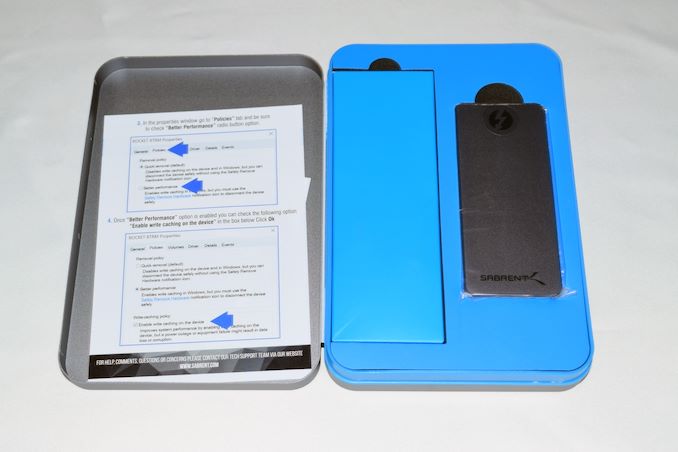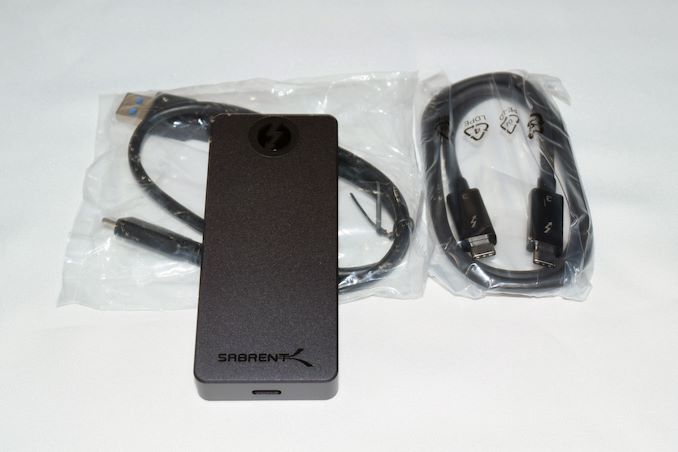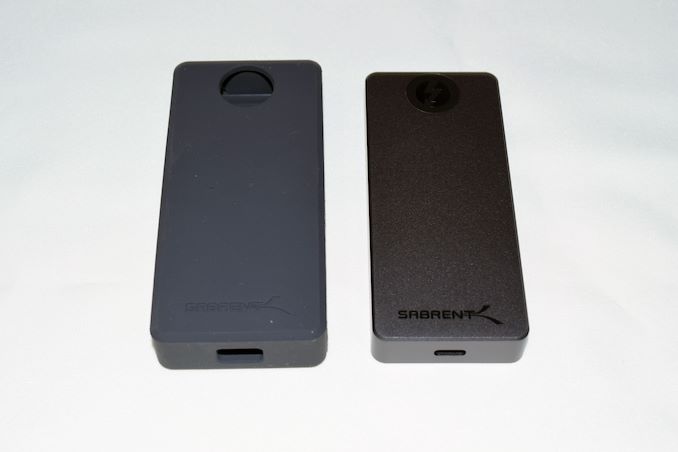Sabrent Rocket XTRM-Q USB / Thunderbolt 3 Dual Mode External SSD Review: Yin and Yang
by Ganesh T S on December 14, 2020 9:30 AM ESTDevice Features and Characteristics
Sabrent packs its drives into metal cases, delivering the look and feel of a premium product. Inside the box, we have the main SSD and a box containing the cables - a USB 3.2 Gen 2 Type-C to Type-A one, and a Thunderbolt 3 Type-C to Type-C one. A note with directions to change the caching policy for the drive is also included, as shown in the picture below.
The write-caching policy problem is an issue for all Thunderbolt 3 SSDs in the market, and is not restricted to the Sabrent Rocket XTRM-Q. Despite the provided directions, we evaluate all SSDs (including our DIY Thunderbolt 3 SSD using the TEKQ Rapide enclosure and the WD Black SN750) in the default state with write caching turned off - This ensures we are comparing apples to apples even when the units under consideration use different host interfaces.
The Sabrent Rocket XTRM-Q is bundled with the longest Thunderbolt 3 cable (70cm) we have seen so far in any Thunderbolt 3 SSD. Sabrent also provides optional shockproof protection in the form of bumpers for the XTRM-Q. At less than 130g, the drives are light but the aluminum enclosure lends solidity.
The table below compares the features and characteristics of the various SSDs dealt with in the review today.
| Direct-Attached Storage Characteristics | ||
| Aspect | ||
| Upstream Port | USB 3.2 Gen 2 and Thunderbolt 3 Type-C | USB 3.2 Gen 2 Type-C |
| Bridge / Controller | Intel JHL7440 + Phison E12S-based Sabrent Rocket Q | ASMedia ASM2362 + Silicon Motion SM2263 |
| Flash | Micron 96L 3D QLC | Micron 96L 3D QLC |
| Power | Bus Powered | Bus Powered |
| Physical Dimensions | 190 mm x 132 mm x 17.53 mm | 110 mm x 53 mm x 11.5 mm |
| IP Rating | N/A | N/A |
| Weight | 129 grams (without cable) | 101 grams (without cable) |
| Cable | ~50cm USB 3.2 Gen 2 Type-C to Type-A ~70cm Thunderbolt 3 (Type-C to Type-C) |
23 cm USB 3.2 Gen 1 Type-C to Type-C Type-C to Type-A adaptor bundled |
| S.M.A.R.T Passthrough | Yes | Yes |
| UASP Support | Yes | Yes |
| TRIM Passthrough | Yes | Yes |
| Encryption Support | N/A | N/A |
The Sabrent Rocket XTRM-Q is available in capacities ranging from 500GB (with a MSRP of $230) to 8TB (with a MSRP of $2000). This high capacity is achieves thanks to the use of Micron's 96L QLC NAND. QLC brings along a host of challenges related to endurance and slow write speeds. SSD vendors solve this by bringing in overprovisioning and SLC caching. Sabrent indicated that the XTRM-Q models come with around 9% over-provisioning out of the box. SLC cache size varies based on the drive capacity, and that is one of the aspects we evaluate further down in this review.













14 Comments
View All Comments
ballsystemlord - Monday, December 14, 2020 - link
@Ganesh When selecting "print article" the ATTO, and PCMark10 benchmarks don't show up. There might be others missing. I didn't do a page for page comparison.ganeshts - Monday, December 14, 2020 - link
Though I can't do much in terms of a solution for this, I can give you the technical explanation:The 'Print View' unfortunately strips out everything between <script> and </script> on a page - so, none of the drop-downs actually work in that view. In addition, this behavior makes pages with multiple script tags for different drop-downs end up with the content between them going kaput (as you have noted).
RSAUser - Tuesday, December 15, 2020 - link
In Firefox: right click, inspect element, look for the div with a class of articleContent and hit right click on it and select screenshot node.ricebunny - Monday, December 14, 2020 - link
I noticed the issue of SLC write caching not enabled when trying out the Orico TB3 aluminum enclosure. Both the 970 Evo Plus and Kingston KC2500 NVMe drives topped out at only 880MB/s write in CrystalMark.I think this warrants further investigation.
Tomatotech - Monday, December 14, 2020 - link
Is there a way to buy just the chipset - maybe on Alibaba?Deicidium369 - Wednesday, December 16, 2020 - link
You mean the Intel controllers? Are you wanting to buy more than 10,000?hubick - Monday, December 14, 2020 - link
"a unique product line in the market – a dual-mode SSD that can work with both Thunderbolt 3 ports and USB ports"Not entirely unique - I'm typing this on a Linux system booted off a 2TB "LaCie Rugged SSD Pro" which uses the same JHL7440 Titan Ridge chipset.
ganeshts - Monday, December 14, 2020 - link
Does it work when connected to a USB host? As far as I could find in my research, this is the only SSD that works when connected to a USB host and also a Thunderbolt 3 host *with higher performance* in the latter case.hubick - Monday, December 14, 2020 - link
Yes. I'm actually swapping between USB on this Threadripper desktop, my Hades Canyon NUC, and soon a Razer Book 13 if it ever gets here :-)Deicidium369 - Wednesday, December 16, 2020 - link
I have looked as well - tons of Orico HD docking.... Maybe he could post the model number.